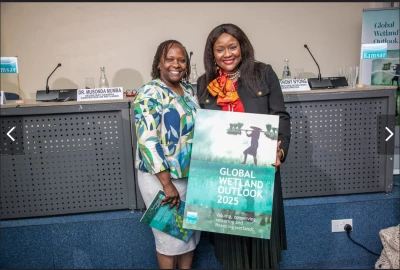- The report, based on the latest scientific and economic data, warns that one in four of the world’s remaining wetlands is in poor ecological condition, with the steepest recent declines observed in Latin America, the Caribbean, and Africa.
 Dr. Musonda Mumba, Secretary General of the Convention on Wetlands(R) and Dr. Julie Mulonga, Director Wetlands International Eastern Africa(L).
Dr. Musonda Mumba, Secretary General of the Convention on Wetlands(R) and Dr. Julie Mulonga, Director Wetlands International Eastern Africa(L).Wetlands are disappearing faster than any other ecosystem on Earth, threatening biodiversity, livelihoods, and critical ecosystem services valued at over $39 trillion, according to a new report launched in Nairobi.
The Global Wetland Outlook 2025: Valuing, Conserving, Restoring and Financing Wetlands (GWO 2025), unveiled on Tuesday, paints a stark picture of global wetland loss.
The report reveals that 22% of the world’s wetlands have vanished since 1970—equivalent to more than half a billion football fields. If urgent action isn’t taken, another 20% could disappear by 2050, triggering massive ecological, economic, and social losses.
Wetlands refer broadly to areas where water saturates the soil or dominates plant life. These include lakes, rivers, swamps, coastal seas, and estuaries. Wetlands are home to rich ecosystems such as mangrove forests, seagrass beds, and saltmarshes.
Despite covering just 6% of the Earth’s surface, wetlands contribute over 7.5% of global GDP through services like clean water, food production, flood protection, shoreline stabilization, and carbon storage. However, wetlands face mounting threats from climate change, pollution, and human development, prompting renewed calls for conservation and restoration.
The report, based on the latest scientific and economic data, warns that one in four of the world’s remaining wetlands is in poor ecological condition, with the steepest recent declines observed in Latin America, the Caribbean, and Africa.
“Wetlands bankroll the planet, yet we are still investing more in their destruction than in their recovery,” said Dr. Musonda Mumba, Secretary General of the Convention on Wetlands. “The world is sitting on a $10 trillion opportunity. Restoring wetlands could unlock these benefits, but we’re running out of time.”
The GWO 2025 outlines the extent of global wetland loss, the cost to societies, and the actions needed to reverse the trend. It also provides financing solutions to support countries in meeting international environmental goals.
“Wetlands are not a marginal issue—they’re fundamental to the water cycle, vital for climate resilience, and essential for the well-being of billions,” said Dr. Hugh Robertson, Chair of the Scientific and Technical Review Panel and lead author of the report. “We have the tools and the knowledge to act. What’s missing is sustained investment and coordinated global action.”
Without decisive intervention, the report estimates the loss of wetlands could cost the world up to USD 39 trillion in benefits, affecting people, economies, and nature. These losses directly undermine efforts to combat climate change, biodiversity loss, and sustainable development.
Reacting to the findings, Julie Mulonga, Director of Wetlands International Eastern Africa, warned that wetland degradation is already having visible impacts across Africa. “Our rivers are drying up, our lakes are polluted, and our coastal wetlands are disappearing.
Communities are feeling the effects through water shortages, declining farm and fishery yields, and increasing vulnerability to floods and sea-level rise,” said Mulonga. Despite the grim outlook, she expressed hope that growing awareness and local restoration efforts could help turn the tide.
In Eastern Africa, communities are pioneering restoration initiatives. In Ethiopia, over 3,300 hectares of wetlands have been revived using nature-based solutions. In Kenya, youth-led groups have restored 100,000 mangrove trees, supporting eco-enterprises like crab farming, beekeeping, and climate-smart agriculture.
In Uganda and Tanzania, peatland and mangrove restoration projects in Sango Bay–Minziro and the Rufiji Delta are helping protect vital carbon sinks and build climate resilience.
The Global Wetlands Outlook 2025 is expected to galvanize action among the 172 countries gathering later this month at the Convention on Wetlands COP15 in Zimbabwe. Delegates are urged to seize the moment to scale up national and international efforts to conserve and restore wetlands, aligning their actions with global climate, biodiversity, and sustainable development goals.
©Citizen Digital, Kenya

 5 days ago
165
5 days ago
165


